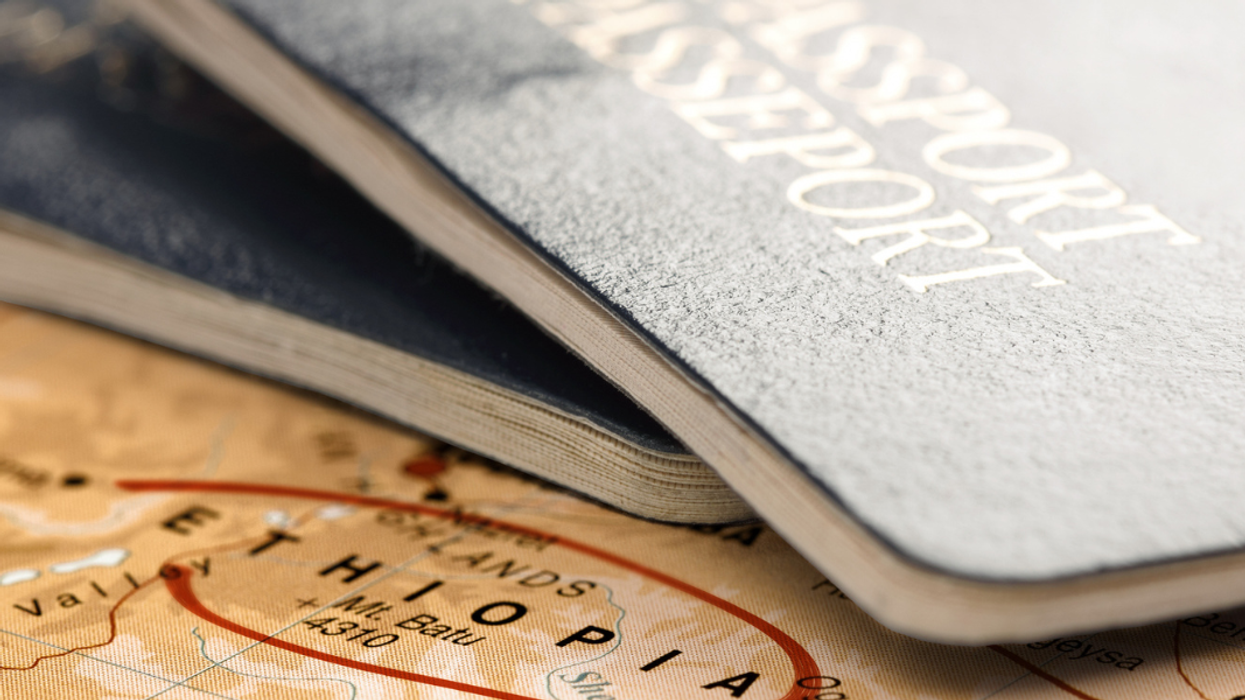Ethiopis is a co-founder of United Stateless. He lives in the D.C. area.
Until recently I managed eight gas stations in the D.C. area, seven days a week. I'm a classic example of this country's reliance on labor by people from elsewhere. For more than 20 years I worked 13-hour days and would cover shifts whenever somebody called in sick. Double shifts were a regular thing. Sometimes I’d work 36 hours straight. I'd train the staff, and often mentored them. Many of my staff were new to the country themselves and I would help them navigate things. I helped many of them figure out how to switch jobs or go to school.
As the pandemic hit, another company reached out to me. They offered me the chance to buy a gas station of my own and be my own boss. It was very exciting, but I couldn't take them up on it. The reason is, I'm stuck in an odd legal limbo called "statelessness." So, I can't get the papers I would need to run my own business, even though I've spent more than 20 years trying.
Statelessness is a weird thing. Being stateless means no country will claim us as a citizen. We don't belong anywhere. There are millions of stateless people around the world, and we all have our own stories. Estimates are that there are only about two football stadiums of us in America, though. I mean around 200,000 people.
In my case, I was born in Ethiopia, but because my father was born in next-door Eritrea, I was unlucky. There has been an ongoing bloody war between the two countries since the 1990s. Based on my Eritrean blood, the Ethiopians tortured me in prison for three months. When I got out of prison, I fled the country. And I've been trying to sort out my legal status since I arrived here in America. I've even gone to the Ethiopian embassy begging them for an Ethiopian passport, but they've told me “No." And it's clear that if I went back to Ethiopia, death is waiting. I'm stuck between a rock and a hard place.
International human rights law says every person has a right to be a citizen of a country. Still, in the US there is no pathway for stateless people to regularize our status. In 2021, the US Department of Homeland Security announced a new commitment “to adopt a definition of statelessness". Last year, Secretary of Homeland Security Alejandro Mayorkas affirmed the commitment again during an appearance on PBS NewsHour. He aimed to deliver on it that year. But we're still waiting. By taking such a simple step, the authorities could extend a lifeline to thousands of people stuck in legal limbo, including me. It just hasn't happened yet. Meantime, I'm unable to build a full life here in the United States. I would love to be able to take advantage of opportunities like the one I had to start my own business. But I can't do it. I also feel it would be unfair on a woman if I started a relationship with her because I can't offer her my nationality. I don't have one.
Most people don’t know about statelessness but when they hear about it, they want to help. Senators Lisa Murkowski and Dan Sullivan (R-Alaska) recently passed a bill to regularize the status of one stateless person. Rebecca Trimble spent her entire life living the American dream in Alaska, raising a family. Then she faced threats of deportation to a country she's never known. It happened because she was technically stateless, even though she hadn't known. I'm so glad the two Senators stepped in.
Another stateless Houston soldier was recently awarded citizenship after a lengthy legal battle. He got caught in stateless limbo despite being born in New York and issued a passport at birth. It's a strange situation that can happen to anyone, especially in geopolitical events beyond people's control.
If you were born in the part of Ukraine recently invaded by Russia, you can't go back there, either. You may become stateless. It would be so much more efficient to take care of this issue fast, instead of one person at a time. Now two members of Congress, U.S Sen. Ben Cardin and Rep. Jamie Raskin (D-Maryland), have acted. Their Stateless Protection Act would resolve the status of stateless people in America. I hope it finds the bipartisan support it deserves.
I would love to have contributed to Ethiopia's economy back home. I'd like nothing more than to own my own business here in America and contribute to the American dream. But until we find an administrative fix for statelessness, this country will miss out.


















 Senate Committee on Commerce, Science, and Transportation ranking member Sen. Maria Cantwell (D-WA) (R) questions witnesses during a hearing in the Russell Senate Office Building on Capitol Hill on February 10, 2026 in Washington, DC. The hearing explored the proposed $3.5 billion acquisition of Tegna Inc. by Nexstar Media Group, which would create the largest regional TV station operator in the United States. (Photo by Chip Somodevilla/Getty Images)
Senate Committee on Commerce, Science, and Transportation ranking member Sen. Maria Cantwell (D-WA) (R) questions witnesses during a hearing in the Russell Senate Office Building on Capitol Hill on February 10, 2026 in Washington, DC. The hearing explored the proposed $3.5 billion acquisition of Tegna Inc. by Nexstar Media Group, which would create the largest regional TV station operator in the United States. (Photo by Chip Somodevilla/Getty Images)
